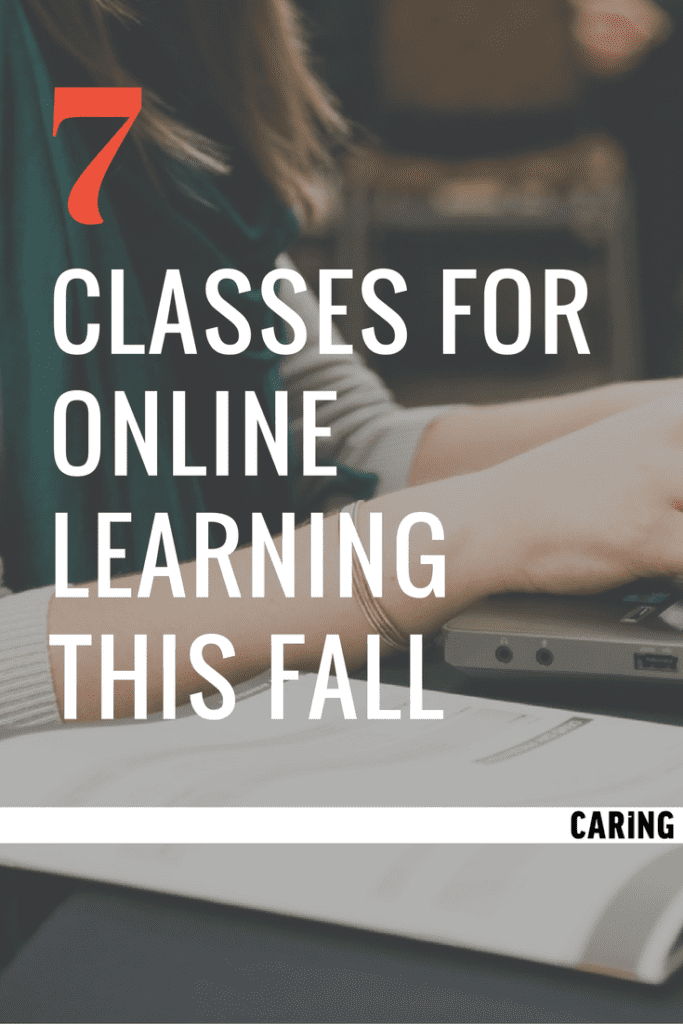You might not be headed back to school this fall, but that doesn’t mean the learning is over.
Here’s seven free educational opportunities across interests to stretch your mind and discover something new this fall.
Managing My Money
With real incomes falling and personal debt at a record high, there has never been a better time to improve your personal financial skills—Managing My Money aims to do just that.
This free online eight-week course starts by giving you practical guidance on how to compile a budget and use it to make good decisions about your spending. You’ll explore debts and investments, and find out how mortgages are used to finance home ownership. The critical issue of pension planning is explained, with guidance on different pension products.
The course concludes by examining different types of insurance and offers practical advice on how to make rational decisions about which insurance products to buy.
Using up-to-the minute data, you’ll develop financial skills and approaches that are relevant globally.
The Ancient Greek Hero in 24 Hours
Explore what it means to be human today by studying what it meant to be a hero in ancient Greek times with Harvard University.
In this 17-week introduction to ancient Greek culture and literature, learners will experience, in English translation, some of the most beautiful works of ancient Greek literature and song-making spanning over a thousand years from the eighth century BCE through the third century CE: the Homeric Iliad and Odyssey; tragedies of Aeschylus, Sophocles, and Euripides; songs of Sappho and Pindar; dialogues of Plato, and On Heroes by Philostratus.
Techniques for “reading out” of ancient texts allows readers with little or no experience in the subject matter to begin seeing this literature as an exquisite, perfected system of communication.
Writing for the Web
Understanding the difference between writing for print versus writing for the web starts with learning about how readers behave differently online. This four-week course from Open 2 Study brings to light how to accommodate the needs of online readers through web design, writing style, structure and search engine optimization.
It covers the characteristics of good online content, and considerations from search engines to tone of voice.
At the end of the course you will be able to write more concisely, ensuring you provide the right message to the reader at the right time.
The Science of Happiness
We all want to be happy, and there are countless ideas about what happiness is and how we can get some. But not many of those ideas are based on science. That’s where this eight-week course from the University of California, Berkeley comes in.
“The Science of Happiness” teaches the science of positive psychology, which explores the roots of a happy and meaningful life. Students will engage with some of the most provocative and practical lessons from this science, discovering how cutting-edge research can be applied to their own lives. Created by UC Berkeley’s Greater Good Science Center, the course will zero in on a fundamental finding from positive psychology: that happiness is inextricably linked to having strong social connections and contributing to something bigger than yourself—the greater good. Students will learn about the cross-disciplinary research supporting this view, spanning the fields of psychology, neuroscience, evolutionary biology, and beyond.
What’s more, “The Science of Happiness” offers students practical strategies for tapping into and nurturing their own happiness, including trying several research-backed activities that foster social and emotional well-being, and exploring how their own happiness changes along the way.
Forensic Psychology: Witness Investigation
Explore how your own mind works, and discover how the limitations of the human brain can lead to major miscarriages of justice in this eight-week course from The Open University.
Despite advances in forensic science, eyewitness testimony remains a critical component of criminal investigations. Psychological research has revealed the dangers of relying on evidence gained from an eyewitness and also how careful the police need to be when questioning witnesses.
Using videos of real witnesses and from cameras that go behind the scenes of a police investigation, this course explores the psychology of eyewitness testimony. You will get the chance to test your own cognitive skills and to see whether your powers of investigation are as good as a crack squad of police officers, as you try to solve a crime using nothing but evidence from eyewitnesses.
The Science of Nutrition
Are we really what we eat? And how do we know what is in our food?
This free four-week online course from The Open University will look to answer some of these questions, by looking at the science behind nutrition, covering aspects of biology, chemistry and physics. You’ll look at the components of food that are given on food labels and consider how these are processed by the body.
There will be some human biology, focusing on the digestive system, including the liver, and the bloodstream, which carries the processed food components to all parts of the body. You will also find out how much energy different sorts of foods supply.
You will have the opportunity to carry out some experiments to find out a little more about the role that acid plays in digestion and how enzymes work, as well as working out how much energy is contained in a single peanut.
Finally, you’ll consider some of the advice that is given about what constitutes a healthy diet and how overconsumption has led to an obesity epidemic in many countries of the world.
Islam Through Its Scriptures
Islam is often incited in violent attacks, yet what does the religion really stand for? How can you improve your understanding of Islam and its most important holy text, the Quran? How can you make sense of a tradition and a text that have been interpreted in different ways across vast geographical spaces for nearly a millennium and a half?
Using a multimedia and student-centered approach, this four-week Harvard University religion course—part of the World Religions Through Their Scriptures series—provides tools and perspectives for understanding the role of the Quran in the Islamic tradition. Learners will develop the skills and context to read the text themselves, while also being introduced to some of the issues classical and contemporary interpreters have addressed. This approach enables learners to explore the influence of the Quran on diverse Muslim understandings of Islam.













